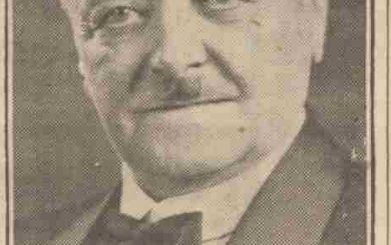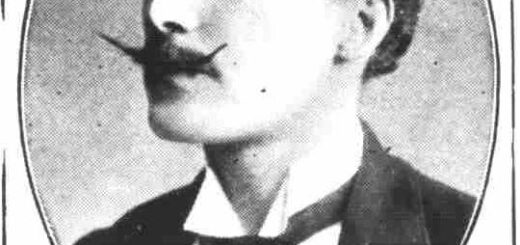Joseph Hopwood 1838- 1913, Drill Instructor, Blackpool Artillery Volunteers.
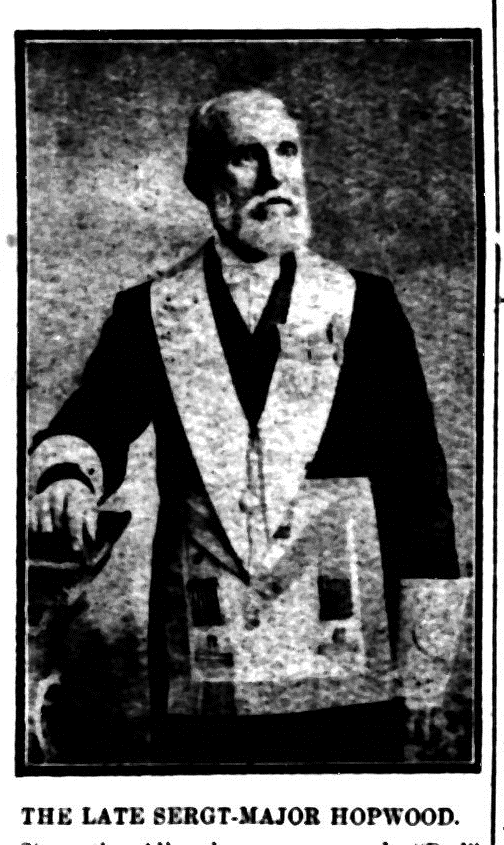
Joseph Hopwood was born in Manchester in 1838 and died in Blackpool on February 13th 1913 after living in the town for 40 years. A veteran of Britain’s imperialistic age, he had been over 20 years in both the Honourable East India Company and the Horse Artillery. He had a patriotic streak within him which lasted all his life, and it may be that the war in the Crimea, for which he was too young to join up, had instilled into him that sense of duty and patriotism at a time when Victorian Britain was basking in Empire. As soon as he was able, and at 18 years old, he joined the army and saw action in India including what has come down in history as the Indian Mutiny and, at the time of his death, he was one of the last few living veterans of that event. Once out of the army he joined the National Reserve and, proud of his medal, he went to the grave with it pinned to his breast. At this time he had been in Blackpool about 40 years and, in his role as Sergeant-Instructor in the Blackpool contingent of the Lancashire Artillery Volunteers, he was instrumental in creating the Drill Shed (Hall) in Yorkshire Street opened in 1876 for training and gathering purposes. For carbine instruction and practice, the shooting range was at Starr Hills, on the ‘sand hills and rabbit warrens’ (thanks to OS maps 1891) about where the Big Blue Hotel currently stands (2024).
He was a Freemason and was present at the Lodge meetings and, in his role as respected Drill Sergeant to the Artillery Volunteers, present, too, at many civil events. Latterly, in older age, he was employed as a theatre stage doorman and was working at the stage door of the Palace Theatre on Victoria Street only hours before his death. He is buried in Layton cemetery and his coffin was conveyed from his home on a gun carriage, which was draped in a Union Jack. Curtains and blinds were drawn in the short route from his home at St Anthony’s Place, as the cortege which included Volunteers, musicians, theatre staff, friends and family, made its way to the cemetery where a crowd of over a thousand mourners had assembled and the Rev N S Jeffreys of St. John’s, and formerly chaplain to the Volunteers, conducted the funeral service.
Joseph’s Life
If the censuses can be interpreted correctly, it would suggest that Joseph’s parents were Joseph and Mary and, in 1841, Joseph senior is working as a cabinet maker, living at 17 Thompson Street, Manchester but no indication to identify the address more precisely. There are two children, Joseph at three years old and James at 21 months. An 1851 census for Chorlton cum Medlock is soiled and difficult to read but is identified as containing the name and address of Joseph Hopwood.
For Joseph junior, there is a baptism date of 5th February, but no birth date seen, so he would have been just into his 76th year when he died though the newspaper reports of his death give both 77 and 78 as his age.
Joseph junior married Margaret though a marriage date or place as not yet been identified. Their first son, William, was born in the first quarter of 1870 in the garrison town of Shoeburyness, Essex which housed the barracks for the Artillery. From here the young famiy moved to Seaham, Co Durham, where a second son Arthur was born and then a final move to Blackpool and the third son Henry, (born Sep 26th 1873). This must have been a relief for Margaret, a young woman committed to the trials of pregnancy while constantly on the move. The rest of their children were born in the town, baptised at St John’s Church and some marriages also took place there as the family had finally settled.
On his discharge from the military in 1880, his length of service was given as 26 years and 36 days of which 7 years was spent in the East Indies. Enlisting in 1857 his military records show him at first in the Indian Artillery and then in the Royal Artillery after those seven years. Once in the Royal Artillery, he was soon promoted from Gunner to Bombardier and almost as soon demoted, perhaps the difference in discipline between the two, if the Indian Artillery was part of the Honourable East India Company which the newspaper reports at his death have him in, was too difficult to adjust to. So, in 1863, he was deducted pay and pension while awaiting trial for ‘disgraceful’ conduct at a Courts Martial, and spent 191 days in prison. The nature of this military offence is not known but it did not result in discharge and, on his release, he went through promotions again reaching the rank of Sergeant. By now he was back in England and once his first term of service had ended in 1868, he re-enlisted at Aldershot in the Coast Brigade living at Shoeburyness in Essex and Seaham in Co Durham before moving to Blackpool and in which Coast service he continued in the town until 1880. A third term of service was ended in 1886 when he purchased his release from the contract and he continued to receive a pension.
On the census return of 1871 he is living in Marlborough St., Seaham with his wife Margaretand 1 year old son William. He is a Sergeant in the Royal Artillery. His second son, Arthur, is born here.
On the 1881 census Joseph Hopwood is in Blackpool, living at Warbrick Street. Here, the number is obscure but the next number in sequence is No 1 Warbrick St and the address before it is Bickerstaffe St. At 41 years old as his stated age, he is a ‘pensioner sergeant instructor to gunnery in Volunteer artillery’. He is living with his wife Margaret and six children, the eldest William Bertram is 11 years old, then there is Arthur, Henry Royle, Ernest Joseph, an only daughter Ellen Maria and then youngest, 2 year old Frank Malcolm. On the censuses, Margaret is Irish and born at Athlone.
In 1891 Joseph Hopwood is living at 26 Charles Street. There are six children at home, William, Henry, Ernest, Ellen, Frank and Ben. William is a blacksmith and Henry is a whitesmith. Ernest works in photography. Joseph himself is an insurance agent.
In 1901 Joseph and Margaret are still living at 26 Charles Street while the family have all flown the nest. Looking to the right of their front bay window they would have been able to watch the Tower being constructed as it rose gradually into the air from its foundations in 1891. Here Joseph is described as a pensioner Royal Artillery and ‘Hall Keeper at Theatre’.
On the 1911 census Joseph and Margaret are now living at 26 Cecil Street. Joseph is an army pensioner. With them are son William Bertram and family and son Ernest who is a picture framer. William is a blacksmith.
Volunteers
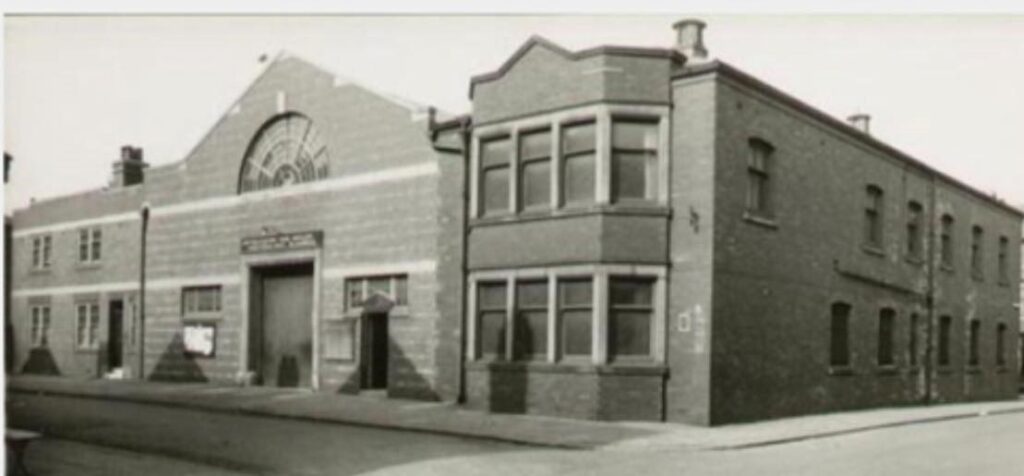
In 1872 shortly before the time that Joseph became involved with the Volunteers in Blackpool, the retaining allowance for a volunteer as explained by an ex lieutenant concerned about the cost of the potential formation of a Volunteer unit in Poulton, consisted of £1 10s (£140.41) per annum for an ‘efficient’ with 5s (£23.40) travelling allowance per annum and then with £2 10s (£230.65) extra for officers and sergeants. Any other costs would have to be borne by self, or subscriptions and gifts. The wording of the oath of allegiance that the young men volunteering would have to take would appeal to any young male with the self-confidence of a natural aggression reads, ‘I (name), do sincerely promise and swear that I will be faithful and bear true allegiance to Her Majesty Queen Victoria, and that I will faithfully serve Her Majesty in Great Britain or the defence of the same against all her enemies and opposers whatsoever, according to the conditions of my service, so help me God.’ It was the kind of patriotism expected of a soldier and one which Joseph successfully taught in training during his time as Instructor.
In 1871, and shortly before the arrival of Joseph Hopwood in the town, the need for indoor premises for the Volunteers was suggested, and a drive to create funding for a Drill Shed began. Much of the training had for some reason to be done in the winter, perhaps when the men, as volunteers, whatever their jobs and position in society, had more time to give out of season. While Lieutenants J Hardman and T Gorton were singled out for effort towards the fund, the main character was Sergeant J Hopwood CBRA (Coastal Brigade Royal Artillery). Subscriptions and funding came from an annual ball and concerts and an exhibition in May of 1872 entitled the ‘Volunteer’s Exhibition’ held at the Prince of Wales Arcade. At this exhibition, among paintings, items of natural history which included cases of bids and insects, steel engravings, geology, coins and oriental curiosities, books and photographs, the many items lent to the Exhibition by generous contributors, Joseph Hopwood offered a coloured drawing of the service fuses. The Drill Hall erected in Yorkshire Street had been completed by June 1876 when the Lancashire Artillery Volunteers held their annual inspection and later, at the supper at the Prince of Wales Hotel, the health of Drill Instructor Hopwood was toasted among many other toasts.
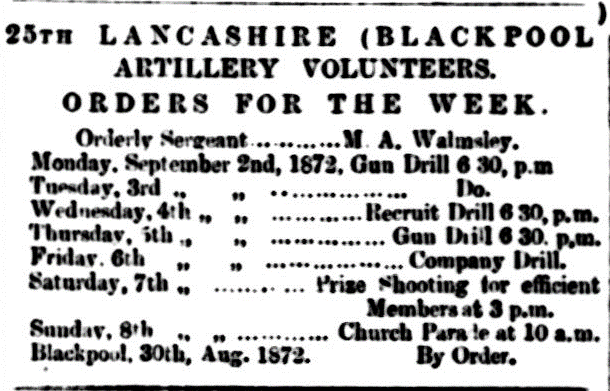
In March of 1873 Sergeant Joseph Hopwood received a backhanded compliment from the Rev Wayman at the annual tea party and meeting of the United Free Methodists at the church on Adelaide Street. The chapel had recently been refurbished and dry rot eradicated and it was now a pleasant place to worship, bright and beautiful. According to the Rev Wayman, it was not a place that would suit the rigid Puritan who would be contemptuous of such brightness, beauty and decoration and, ‘Some people, when they saw the interior of that chapel, might say that they were not treading in the footsteps of Puritans, as some did not think they could do that unless they got their hair cut round, had a face as long as a decent fiddle, and walked as if they been especially drilled by Sergeant Hopwood only to go so many inches to a pace.’ There’s no mention of a laugh at his reference in the gathered company but, no doubt, at least an appreciative smile, or a giggle that might have broken out into audible laughter which might have made itself heard within the chapel. However Sergeant Hopwood had certainly made a name for himself with the exercise of a rigid discipline.
Later on in the year in November at the dinner in the Octagon Room of the Assembly Rooms for the 25th Lancashire Artillery Volunteers held after the shooting competition at the range at South Shore, Joseph Hopwood was singled out by the Chairman, Lieutenant John Hardman as ‘one of the best drill instructors in Lancashire. The present efficiency of the corps was solely owing to his efforts’ and he had, ‘pleasure in calling on the hon. chaplain to make the presentation. The chaplain of the corps was the Rev N S Jeffrey of St John’s and he presented Joseph with a timepiece, a present ‘no better than he deserved,’ as he had been influential in taking the membership of the Force from thirty at the beginning to over 80 to date. As he was presented with the timepiece, he was greeted with loud cheers. He was very popular with all ranks, who to a man had given generously to the subscription, and described in the eulogies prior to the presentation his manner was that of a true patriotic soldier exemplified by Nelson and Wellington as representing the highest duties of that soldier in the pursuit of victory. From the Fleetwood Chronicle of 14th November 1873, ‘Amidst loud cheering, the timepiece, a very handsome one, in marble, with a circular face, and containing a plate in front with the following inscription, “Presented to Sergt. Instructor Joseph Hopwood, R. H. Artillery, as a token of respect, by the non-commissioned officers and gunners of the 25th L. A. Volunteers, Blackpool, Nov. 13th 1873.”In graciously accepting the gift, Joseph Hopwood said he would always maintain an effort to get the Volunteers to prove they are the finest in Lancashire.
The dinner ended after the usual toasts of self-congratulations and to the monarch and everyone else connected to the forces which, in the opinion of all, were the best in the world, and a toast was made to the hosts of the Assembly Rooms, Mr and Mrs Curwen.
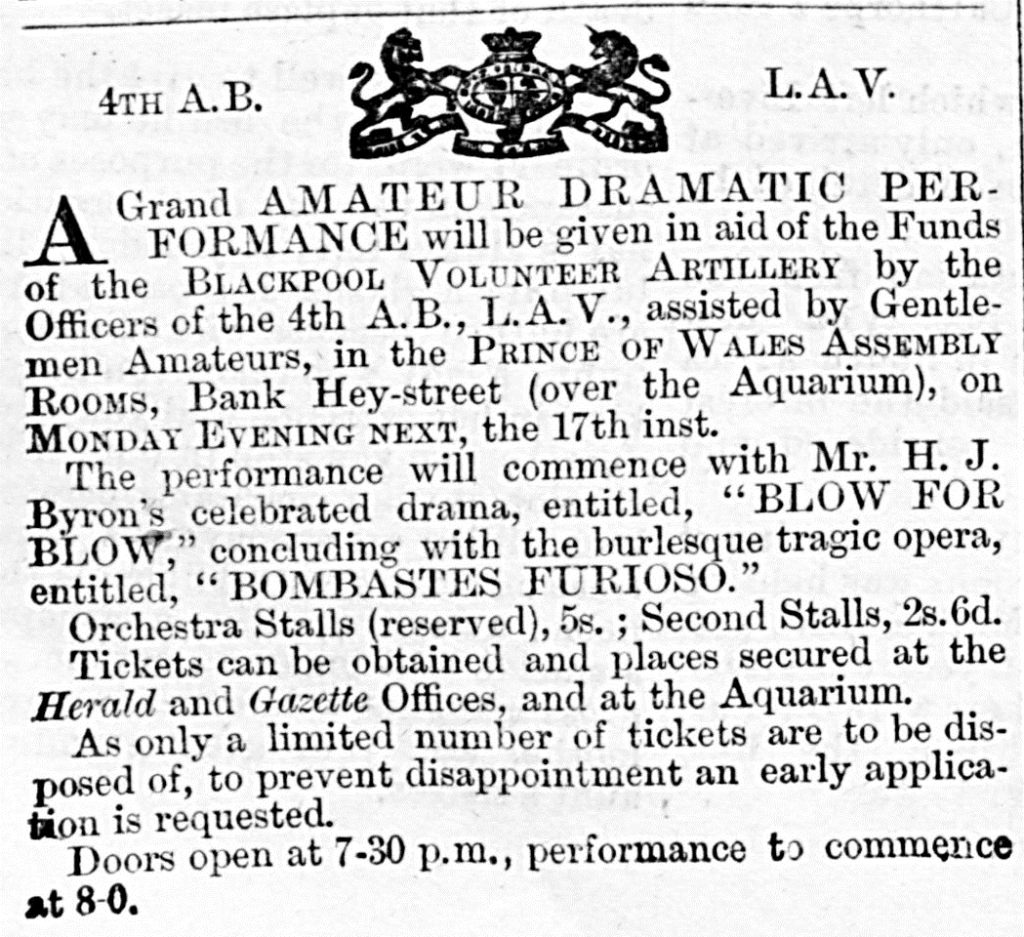
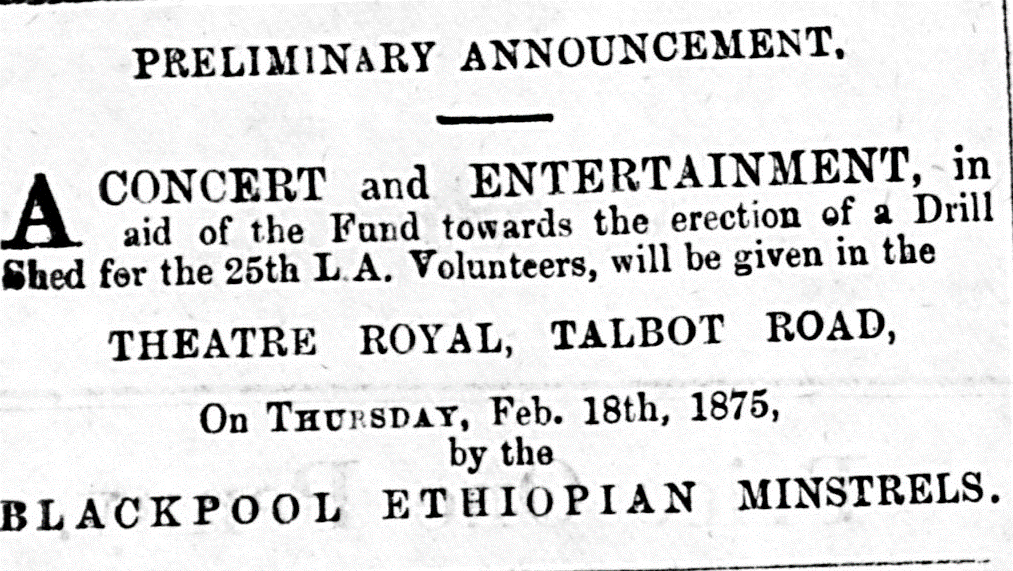
The Drill Hall had changed its status from a ‘shed’ to a ‘hall’ in some descriptions, and the annual inspection of the LAV was held at the Drill Hall in June of 1876 after which a contingent of men went to the Prince of Wales Hotel to have a supper, a sing song and the usual toasts in which Drill Sergeant Hopwood responded with a little speech to the toast given him.
In November of this year, the prizes for the 25th LAV shooting competition were handed out with the usual celebration at the Assembly Rooms. It is recorded as the 11th year since the corps was founded. At this time ‘The 25th LAV March’ had been composed by Herr Albrecht especially for the occasion. In a decorated room, a banner reading, ‘Defence Not Defiance’ represented the intended philosophy of the Volunteers. The meeting was held in the presence of the Mayor, who was also honorary surgeon, Dr Cocker and, in his brief speech Captain Hardman, praises the corps and reminds everyone of its noble duties and refers to the Drill Hall being now completed. But, as usual with these things, the original estimate of cost had been exceeded and his speech included at the end, appeals for further subscriptions and donations to the Drill Shed Fund. As the Mayor distributed the prizes, a silver cross gun badge, awarded as a prize in the shooting competition, and donated by Sergeant Instructor Hopwood, was given to Sergeant R Drummond.
In April 1876 the Drill Hall soon had an alternative use as the second roller skating rink in the town, the other well patronised rink being at Claremont. This was presumably to attract funding and to make it pay for itself. The rink itself had been completed by April and it had been well used after its opening. It was further intended to create a ladies only room and a gents smoking bar. A refreshment bar would also be provided and a ‘ladies only’ day to be arranged. There may have been sponsorship from Plimpton’s roller skates as it is recorded that skaters were keen to ‘test out the quality’ of these skates at the venue.
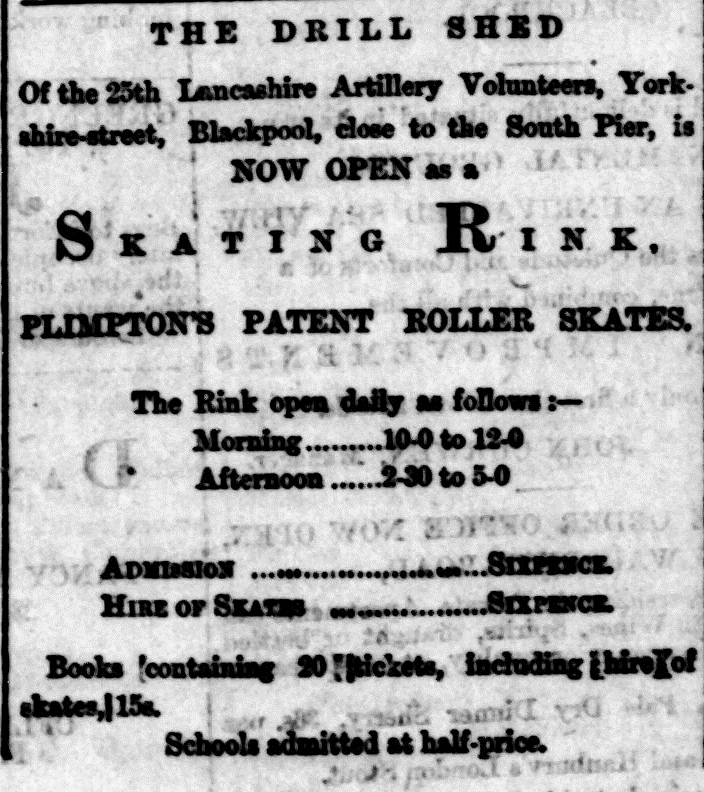
1878 was the year of the opening of the Winter Gardens and the Volunteers were required for the civil duty of escort. It was Thursday July 11th when the Gardens were opened with great pomp and ceremony by the Lord Mayor of London, ‘The Right Honourable Thomas Scambler Owden’. He was met at the North station by the Mayor of Blackpool, Dr Cocker and, while Joseph Hopwood is not mentioned by name, the 25th LAV were in the leading part of the procession as the large entourage made its way to the Imperial Hotel where suites had been retained for the use of the celebrity invitees. Then began a day of ceremony, entertainment with a carnival atmosphere.
Later on in the year, in September, Sergeant Instructor Hopwood was once more the marker for the annual shooting competition held at Starr Hills. The shooting consisted of 100, 200 and 300 yard ranges and the winner awarded a cup which was held for the year. If the cup was won for two consecutive years by the same person, or if he achieved three victories over time, he got to keep the cup. This eventually meant that the cups ran out and in September of 1879 after the annual Honorary Members Challenge Cup was competed, with the previous cups sat on the home shelves or cabinets of the proud victors, it was hoped that there would be generous donors of further cups. Drill Instructor Joseph Hopwood had once more acted as marker in the competition which was open to both Honorary Members and Volunteers.
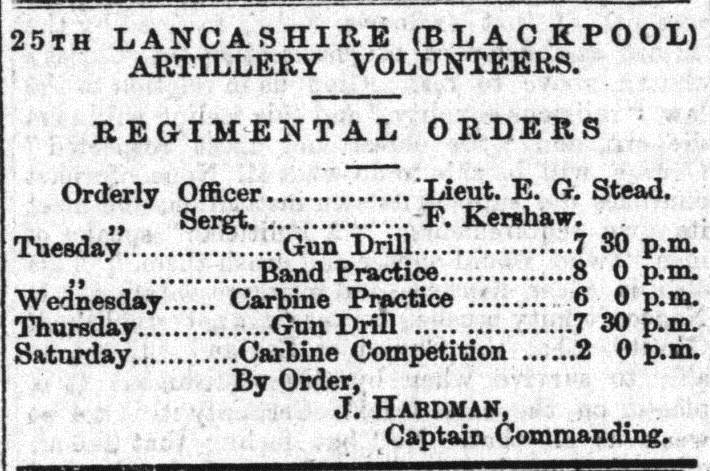
On the 18th September 1879 the inaugural ceremony for the electrical illumination of the town took place. A previous celebration of victory in the Crimean war in 1856 had been by gas light. The starting point for the carnival procession was the Drill Shed on York Street and the torchlight procession collected there at 9.30pm and set off on a winding, circular route through the town ending up back at the Drill Shed where the various floats in the procession disbanded. Of the six, illuminated lights, it was reported that the print of a book could be read at a hundred yards distance and the light from the piers was ‘very beautiful and effective.’ Back at the Drill Shed when the processionists disbanded, the ox that had been roasted earlier and had been paraded in the procession, was eaten along with barrels of beer supplied by the licensees of the town, and foodstuffs provided by others were enjoyed. Outside the Drill Shed in the town the festivities did not finish until the early hours.
In October of 1879 in a match between the 25th LAV Blackpool and the 21st LAV Preston, held at Preston, Blackpool won a close contest by 5 points. As usual, Sergeant Hopwood was the marker for the Blackpool corps. Again, on 29th November, 1879 Sergeant Inspector Hopwood acted out his usual role as marker in the annual carbine competition of the 25th LAV. With many local names on the list, the Volunteers assembled at the York Street Drill Shed, and at 8.30am marched to the range situated at Starr Hills. The competition is reported to have finished at 4pm so it had lasted the full extent of daylight in a time long before daylight saving was introduced. There are three classes of competitors, the ‘efficients’, the married men and the recruits, with prizes for the winners to be awarded at a meeting at the Drill Shed the following Friday evening.
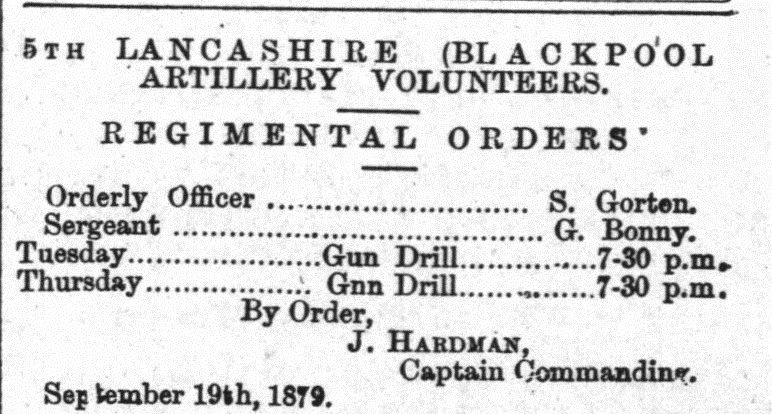
In January of 1880 sergeant Hopwood represented the army at the strangely named, ‘dinner to aged Corporation workmen.’ Perhaps in the days before retirement pension it was considered relevant. Held at the Albion Hotel, Mr Whiteside the Nuisance Inspector of Blackpool was the focus of attention in whose name the dinner was given, and it was hoped that it could become an annual affair. In March of this year Sergeant Hopwood was an ‘invited guest’ at the first annual dinner of the LAV held also at the Albion Hotel. An all-male gathering it is presumed, there was nevertheless, among the usual toasts to Queen, who was the ultimately boss of everything, the nation, the Press and mine hosts, (Mr and Mrs) one to the Lancashire Witches.
For the visit of Lord Derby and Colonel Stanley, to Blackpool to open the Free Library on June 17th of 1880, Drill Instructor Joseph Hopwood was among the group of the Volunteers in the festival of the procession that followed along the circular route along the Promenade and back, from the presentation of Lord Derby at the Free Library in the Octagon Room of the Assembly Rooms on Talbot Road. Blackpool it seems had now qualified to create its own public free library via the original Free Libraries Act of 1850 and books had been donated by various Blackpool people. The first librarian, out of the original 170 applications, was 30 year old Miss Hannah Eteson of Raikes Hill, Blackpool. Despite the fact that there was opposition to her appointment because she was a woman, she was considered to be the most qualified and most suitable. In a series of eliminating votes she won each round and took the final by seven votes to four. Her starting salary was 18s a week (90p approx £90; 2024).
In August of 1880 Sergeant Joseph Hopwood No 4433, had completed his contracted service and received an entitlement to a pension stamped by the Royal Chelsea Hospital. To date he had been in the army for 26 years and 36 days of which nearly seven years had been spent in India. He was asking for discharge after his ‘second period of limited engagement’ in the Volunteers. His conduct during his whole time in the army had been good with four good conduct badges with an entitlement to a fifth and only one record in the regimental defaults book and one conviction before a Courts Martial.
In the 1881 Trades Directory and Almanac published in the Blackpool Herald and listing all the Corporation members and employees, Joseph Hopwood is included as ‘late sergeant RA’ in the No 9 battery 5th LAV stationed at Yorkshire Street. In this Almanac, while the headquarters are in Yorkshire Street, the Brigade Headquarters are in Preston, and the Battery in Fleetwood and there are now about 100 members.
In December 1882 reference was made to the resignation of Sergeant Instructor Hopwood who was not present at the annual LAV dinner and prize giving. It was regretted that it had taken them, at the time, three months to appoint another drill instructor, Sergeant Instructor Milne
He did however, it seems take on another contracted period in 1885 in which he would have been attached to the Volunteers. By 1886, this however, might have proved too much for him one way or another and in 1886 he paid £10 (£1,075.94) to purchase his release.
However the Hopwood name maintained its presence in the Volunteers. In the carbine shooting competition of January 1890, which was nearly ruined by rain, there are two Hopwoods both of who are Gunners. The first on the list isn’t given initials and who came 6th out of 13 competitors and the second, with initials, W B Hopwood who came last. Joseph senior had six sons, one of which was William Bertram Hopwood.
In 1891 Joseph is described on the census return as an insurance agent and in 1897 on the marriage of son Ernest Joseph, to Lily Ainsworth, he is described as a club steward. He is no longer active in the Volunteers, or the Territorials as they would become known, and there is no longer a mention of him in any reference to Freemasonry, so perhaps he had resigned from that too. Towards the end of his life he worked as a stage doorman at the Alhambra Theatre from its inception in 1899 and, from when it was remodelled and reopened as the Palace Theatre in 1904. He knew all the performers, and was well liked by musicians, stage hands and staff and known affectionately as ‘Dad’ or ‘Daddy’ to many of them. His wife Margaret died in May of 1911 while they are resident at 26 Cecil Street, so he would have lived alone until his own death less than two years later.
Freemasony
On 15th June 1875 Sergeant Hopwood was present at the installation of the WM of the Fidelity Lodge No 1256 at the Lodge Room of the Bull Hotel in Poulton, the proprietor of which was Brother P Hornby.
In December of 1885 Joseph Hopwood was invested as Janitor to the Royal Arch Freemasons at the annual festival of the Clifton Chapter No 703 at the Clifton Arms Hotel. In 1887 he is listed as an officer in the Blackpool Lodge of Freemasons No 1476 at the Festival of St John the Evangelist held at the Clifton Arms on the 10th May. And on 25th May, again at the Clifton Arms, he was appointed as equerry at the consecration of the ‘Rose of Lancaster’ preceptor of the Lodge of the Order of Knights Templar. In 1889, at the County and Lane Ends Hotel, and as PM, he had a significant role in the installation of the WM for the Clifton Lodge 703 and, among other duties gave the address to the incoming WM.
In politics he was Conservative and is recorded as having nominated the local candidate for the Talbot Ward in the municipal elections in November of 1891 and had been secretary of the Blackpool Conservative Association during that year but, it seems, resigned through illness.
Death
Joseph died at his home of 20 St Anthony’s Place, on 13th February 1913. It was a sudden death as he had been seen at the rear stage entrance to the Palace Theatre on Victoria Street about four hours before he returned home from his job as doorman. St Anthony’s Place, is round the corner from 26 Cecil Street, the last recorded address on the 1911 census for Blackpool. His funeral took place on Friday 19th of February. Over a thousand people were waiting at the cemetery at Layton before his funeral cortege arrived from the short distance of his home. His coffin was carried to the cemetery on a gun carriage drawn by six horses, which had been brought from Brigade Headquarters in Preston and provided by the 11th Lancs battery RFA, who also provided the firing party, a party, under the command of the celebrated Major T E Topping DSO, of Boer War fame. Joseph himself might have watched the artillery unit entraining for Liverpool at North Station, on an equally cold February morning, en route to Capetown, and the second part of the Boer War, a dozen years earlier under the command of Major Topping. The gun carriage had first arrived at Joseph’s house where it was further adorned with wreaths and covered with the Union Jack. Blinds were drawn all along the short route to the cemetery while the band which consisted of the Silver Excelsior Band the County Borough Band and professional musicians from both the Tower and the Palace played conducted, by a Mr W Taylor. With the music of ‘Marche Funebre’ and the ‘Dead March’ from ‘Saul’ the procession was headed by the smartly dressed firing party in front of the gun carriage immediately behind which were family members and then a ‘strong contingent’ of members of the Territorials and the National Reserve (he was the oldest member). Arriving at the cemetery, the coffin was borne to the chapel where the Rev N S Jeffreys of St John’s, former chaplain to the Volunteers and who had baptised those of his children who had been born in Blackpool, gave a fitting address to the congregation which included his several children and their spouses and grandchildren, and as many friends and associates who could fit inside. The Rev Jeffrey’s address focussed on the character of Joseph and likened his attitude as a soldier, in his instructive capacity to the Reserves, as having the same qualities possessed by such national heroes as Wellington and Nelson and Joseph was one of those men who had clearly done his duty, a duty upon which, in the terms of the military, the Empire had been built. Continuing the somewhat militant aspect of Christianity relevant to the date, ‘They, wanted the Empire to stand to be the dominating Empire of the World. As soldiers of the Lord Jesus Christ, they should be ready for the last call.’ He concluded his speech in the frosty air of the February day at the graveside while the band, with caps removed, fired a volley and played, ‘Nearer My God to Thee’ and after another volley, ‘The Last Post’, before the crowds began to disperse. The Band left the cemetery playing ‘Fallen Hero’.
The Hopwood name with Joseph’s six sons then became quite prolific. Henry Royle Hopwood’s son, and Joseph’s grandson, William Joseph, was captured at Guillemont in Belgium in 1916 and spent the last years of the war as a POW. He worked for the Post Office on being repatriated and married Polly Marsh in 1925. Polly had worked at Parkinson’s munition factory in Blackpool during that war and she had spent her early years in Capetown in the latter part of the Boer War in which Britain lost credibility in its maintenance of Empire with the savagery of the concentration and detention camps for both the defined enemy or potential enemy in the resident Afrikaans population or the more indigenous African. Polly had lost her father when her mother separated from him and left him in Capetown. Bringing the family back to England she chose Blackpool rather than her native North East. Soon Polly lost a sister to meningitis and only having reached nine years of age, was laid in Layton cemetery many years before her mother, and then a brother who was killed in the trenches during WW1. Their son Jack Hopwood born in 1930 at Devonshire Road Hospital worked for the BBC and, continuing the practical proficiency of a family of whitesmiths and blacksmiths of Joseph’s sons, (William had forged a cannon out of metal from the Foudroyant wreck which is now in the Fleetwood museum) and while his brother Joe was busy printing the official Blackpool publicity posters, he created a steadying mechanism for an outdoor broadcast movie camera which was first used at the funeral of Winston Churchill. Jack died in 2022 and his collection of material in his family history has provided much of the evidence to be able to research the above story of his great grandfather, Joseph Hopwood.
Sources and acknowledgements:-
It is thanks to Joseph and June Reed for the acquisition of Jack’s story- and ultimately that of his great grandfather, Joseph’s- in looking after Jack in his old age and through covid.
The British Library Newspaper Archive accessed via findmypast. Census and military records etc. accessed via findmypast.
Thanks to David Wall for the cover image of the Drill Hall on Yorkshire Street.
The siting of the rifle range:-
https://maps.nls.uk/view/101101469
Inflation calculator:-
bankofengland.co.uk/monetary-policy/inflation/inflation-calculator
Shoeburyness:-
https://en.wikipedia.org/wiki/Shoeburyness
The Crimean War end celebrations:-
https//:www.cmronline.co.uk/blackpool-in-the-1850s-kickstart-to-the-modern-town
~~~~ ~~~~ ~~~~
Colin Reed April 2024


